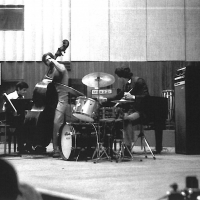Home » Jazz Musicians » Modern Art Trio
Modern Art Trio
"The Modern Art Trio was officially born in Rome between March and April 1968 on the initiative of Franco Tonani and Franco D'Andrea. The idea was to set up a trio that would give a rational order to free music and the sound galaxy that gravitated around it. It was like a leap into darkness without a net, an exploration of unknown lands.
The distinctive contribution of the Modern Art Trio to jazz experimentation is the use of seriality. In the Modern Art Trio project there was no detachment from jazz, but at most some form of contamination: African-American music was the starting point of even daring experiments (the seriality and the system of intervallic areas) but who sought new paths without leaving the field of jazz. The melody of the tunes, their intervallic shape is what provides structure to the music of the MAT. The trio integrates and interacts with a tune close to perfection, thanks to many hours of daily practice and a continuous exchange of ideas. Even in his short life, Il Modern Art Trio will be for Franco D'Andrea the first and significant musical project. It is the place, or rather the dimension, where D'Andrea transports his experiments to put the intervallic system at the very base of the compositions. The pianist’s approach is polymodal and serial, application of his studies on Schoenberg and Webern. Improvisation dominates in the general economy of MAT music, subject however to a strict discipline, to design calculations that precede the musical action and direct it. Moder Art Trio is an important album in the history of Italian and European jazz. For the first time serial music and jazz know a successful synthesis, with the rigor of seriality on one side, on the other the freedom and the irruence of free."
On April 17th and 19th, 1970 the Modern Art Trio recorded for Vedette Records its first and only record. Its title is the name of the band and the cover has the definition of the music played: progressive jazz.
It’s a manifesto of the experiences and experiments that D'Andrea and Tonani were doing in those years: the phrase progressive jazz intends to draw a line of demarcation from the jazz that was played then in Italy and, at the same time, it means innovation and openness.
The album consists of six tracks: three composed by D’Andrea, URW, Fragment and Echoes; two composed by both D’Andrea and Tonani, Un Posto all’Ombra and Beatwitz, conceived in suite form; and a standard, It Ain’t So Necessarily by George & Ira Gershwin.
Awards
Top Jazz 2023 International Reissue Musica Jazz Magazine - 2nd Prize
Tags
Despite being labelled as "free," D'Andrea followed a number of principles in bringing a rational structure to his improvisational ideas. Tonani brought diligent attention to detail and texture. Tommaso guides with fluency with the bow and in his exchanges with the piano. Ideas are exchanged, creative freedom is encouraged and structures fervently broken down. This example of daring experimentation and contemporary expression from the early 1970's is sometimes complex, but is an intense and worthwhile experience.
⭐︎⭐︎⭐︎⭐︎ Neil Duggan on AllAboutJazz USA









